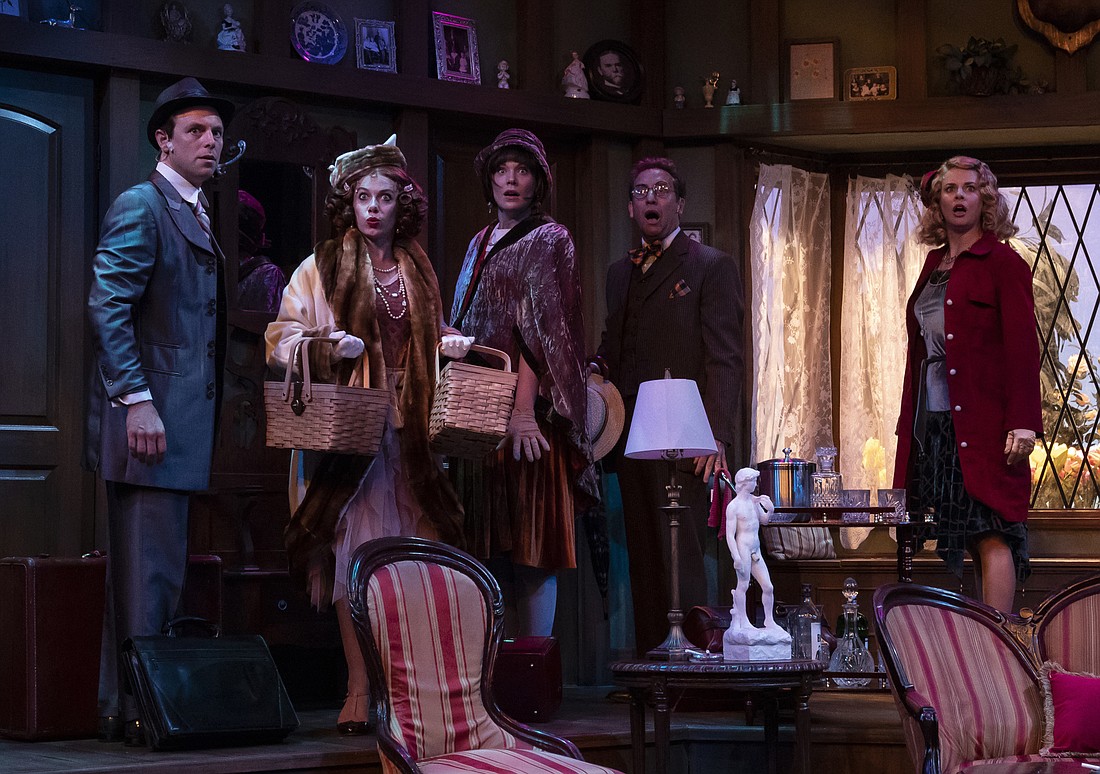- May 5, 2025
-
-
Loading

Stuff a blender with Noël Coward’s risqué comedies and hit puree. The results might resemble Sandy Rustin’s “The Cottage.” Her concoction is now being served at Florida Studio Theatre.
It’s a drawing room farce, but it’s set in a cozy, country cottage in 1923. The plot revolves around the dalliances of Britain’s upper middle class. The combination of libido, free time and money proves volatile.
Sylvia (Hanley Smith) is at the cottage for her annual fling with her beau, Beau (Greg Balla), who happens to be her brother-in-law. A once-a-year love affair leaves Sylvia unsatisfied. She decides to end the charade, and sends tell-all telegrams to her husband Clarke (Drew Hirshfield), and to Beau’s pregnant wife, Marjorie (Tracie Lane). Thanks to Britain’s efficient rail service, they soon show up in person. They’re quickly joined by Deirdre (Anna Stefanic), Beau’s other lover, and Richard (Casey Predovic), Deirdre’s supposedly murderous husband. Permutations of infidelity multiply. Comedy ensues.
Director Jason Cannon gets the most from a splendid cast. Smith is winning as Sylvia, and sells her character turn without overselling it. Balla’s Beau might as well have “CAD” stamped on his forehead, but he’s a decent fellow for all that. Hirshfield’s Clarke and Lane’s Marjorie are both infuriatingly unflappable.
Although Predovic’s Richard seems to have escaped from an asylum for the criminally insane, he’s not immune to a cup of tea. Stefanic’s golden-hearted Deirdre is gleefully self-centered and surprisingly adaptable. Whatever happens, good manners rule all their hearts. Breaking a commandment is one thing, being rude to a guest is quite another. Even if they are waving a shotgun around.
The six actors somehow keep a straight face through the ludicrous material. The same can’t be said for the audience.
This production is filled with clever, fun touches. Andrea Bechert’s set is a comfy, overstuffed bourgeoisie retreat. Every other household object seems to be a cunningly disguised cigarette holder. (This comes in handy. They all smoke like fiends.) It’s all quite homey, cozy, and a bit unnerving. A oversized, brooding portrait of the family matriarch glowers down above it all.
Kudos also to Abby Parker’s costume design. From frilly negligees to ominous trench coats, each characters is as neatly identified as a suspect in a game of Clue. You are what you wear — and that’s part of the gag.
Parody is easy. Great parody is hard — because it transcends parody.
And that’s exactly what Rustin accomplishes here.
“The Cottage” is more than a spot-on Noël Coward imitation. Despite all the tropes and types, it’s a compelling tale about an interesting character—namely Sylvia.
That’s a serious accomplishment, though the play doesn’t have a serious bone in its body.